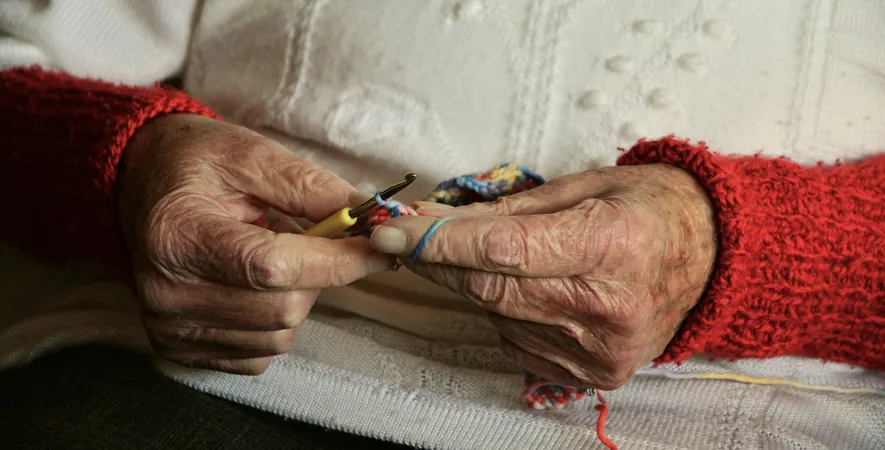
Shocking Study Reveals Breast Cancer Treatments Could Be Accelerating Aging - What You Need to Know!
2024-10-08
Author: Nur
Groundbreaking Study Unveils Alarming Evidence
A groundbreaking study from the UCLA Health Jonsson Comprehensive Cancer Center has unveiled alarming evidence suggesting that widely used breast cancer treatments—chemotherapy, radiation, and surgical interventions—may be speeding up the aging process for survivors. This unsettling discovery raises an urgent question: what does this mean for millions of women recovering from breast cancer?
Research Findings and Implications
Published in the prestigious Journal of the National Cancer Institute, the research indicates that all breast cancer survivors show significant increases in markers associated with biological aging, regardless of their treatment type. Key indicators such as DNA damage response, cellular senescence, and inflammation are heightened in these patients, suggesting a profound impact of cancer therapies on overall health—an impact that extends beyond what had previously been understood.
Expert Insights
Judith Carroll, lead author of the study and an esteemed professor at UCLA, remarked, “For the first time, we’re demonstrating that the aging signals we typically associate with chemotherapy are also evident in women who underwent radiation and surgery.” This finding underscores the necessity of reevaluating the long-term implications of all treatment options available.
Survivorship Statistics and Concerns
As advancements in cancer care have enhanced survival rates—currently estimated at 4 million breast cancer survivors in the U.S., with projections exceeding 6 million by 2040—the link between these treatments and accelerated aging is particularly concerning. Survivors may face a cascade of aging-related issues, including fatigue, cognitive decline, and cardiovascular problems, which could diminish their quality of life and overall longevity.
Study Methodology and Key Findings
The UCLA study meticulously tracked gene expression in breast cancer survivors over two years, assessing changes in biological aging markers pre-treatment and following treatment completion. Utilizing cutting-edge RNA sequencing technology, researchers focused particularly on "zombie cells," or senescent cells—cells that cease to divide yet linger, releasing harmful substances that can accelerate aging and inflammation.
Significant Outcomes
Findings revealed that regardless of the therapeutic approach, survivors exhibited an uptick in genes associated with cellular aging processes, signaling a disturbing trend where immune cells appeared to be aging at an accelerated rate. While chemotherapy exhibited a distinct pattern of gene expression, similar adverse changes were identified in patients who only received radiation or surgery.
Conclusion and Future Research
Julienne Bower, senior author of the study, stressed the investigation's pivotal findings: “The results indicate that breast cancer treatments lead to increased DNA damage and inflammation—key targets for improving recovery and life quality in survivors.” This study signals a pressing need for a deeper understanding of how cancer therapies affect long-term health outcomes.
Moving forward, the research team aims to explore a potential new biomarker that could accurately measure the biological age and aging rate of women undergoing such treatments. Investigators hope to establish whether the aging signals triggered during treatment have lasting repercussions and to identify lifestyle factors—like exercise, stress management, and healthy sleep—that could mitigate these effects.
Looking Ahead
This pivotal research highlights a critical step towards understanding the long-lasting consequences of cancer therapies and paves the way for strategies aimed at enhancing survivorship, not only in terms of longevity but also regarding overall health and quality of life. Breast cancer survivors can look forward to new insights that could reshape their recovery and support their well-being in the years to come.
Stay tuned as researchers continue to unravel this complex narrative—your health could depend on it!



 Brasil (PT)
Brasil (PT)
 Canada (EN)
Canada (EN)
 Chile (ES)
Chile (ES)
 España (ES)
España (ES)
 France (FR)
France (FR)
 Hong Kong (EN)
Hong Kong (EN)
 Italia (IT)
Italia (IT)
 日本 (JA)
日本 (JA)
 Magyarország (HU)
Magyarország (HU)
 Norge (NO)
Norge (NO)
 Polska (PL)
Polska (PL)
 Schweiz (DE)
Schweiz (DE)
 Singapore (EN)
Singapore (EN)
 Sverige (SV)
Sverige (SV)
 Suomi (FI)
Suomi (FI)
 Türkiye (TR)
Türkiye (TR)